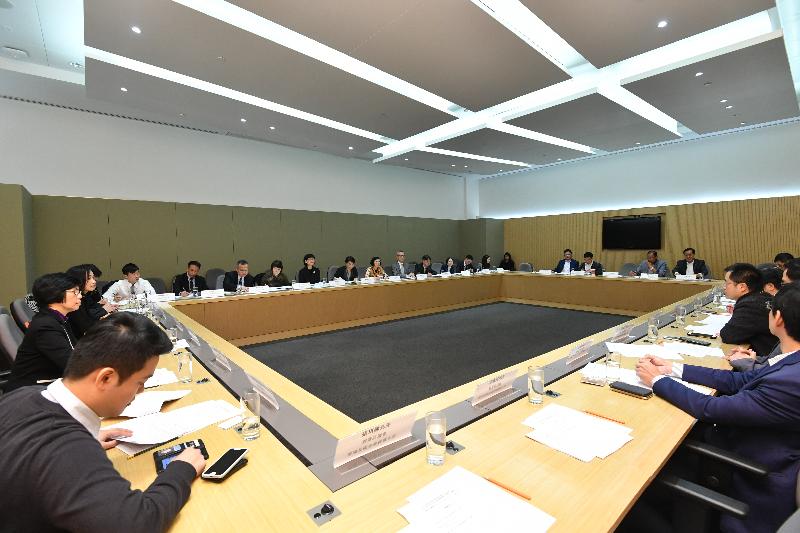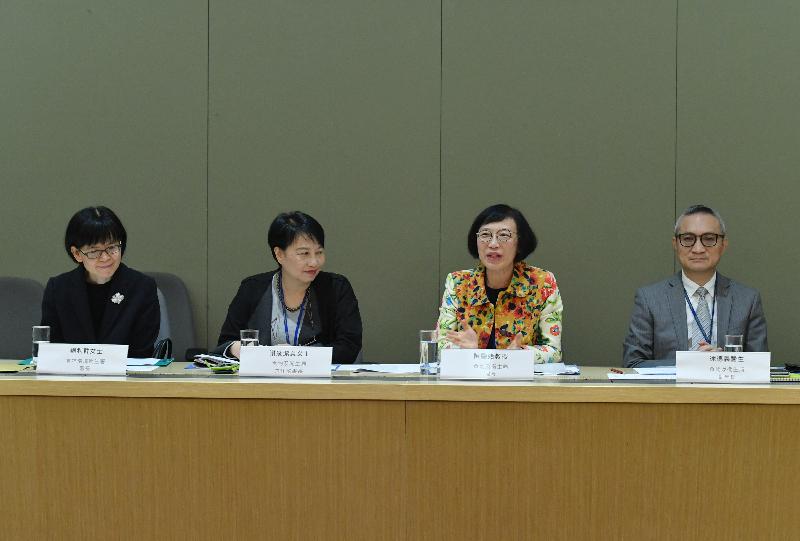SFH meets with District Councils on environmental hygiene (with photos)
***********************************************************************
Professor Chan said, "In this year's Policy Address, the Chief Executive stated that in the coming five years we would deploy resources to improve environmental cleanliness and would continue to step up efforts in law enforcement and prosecution. The Food and Environmental Hygiene Department (FEHD) would additionally provide 17 street cleaning vehicles, 46 high pressure hot water cleaners, mobile teams including 78 supervisors and 518 cleaning workmen and 13 central divider cleaning teams in 2017-18."
The participants noted that the FEHD will extend the Internet Protocol (IP) Camera Scheme to all districts. After considering the suggestions of the DCs, the FEHD conducted a pilot scheme to install IP cameras at six refuse dumping blackspots in Central and Western, Sham Shui Po and Yuen Long districts from late December 2016 to late June 2017. The trial has proven that the installation of IP cameras can have a deterrent effect and is helpful in improving the hygiene condition at the blackspots. Taking into account the views provided at the last meeting between the Secretary for Food and Health and the chairmen and vice-chairmen of the environmental hygiene committees of the 18 DCs, the FEHD will gradually extend the pilot scheme to other districts on a trial basis for one year. The FEHD has completed consultations with the DCs on the installation of IP cameras, and feedback from DC members has been very positive.
In addition, the FEHD will set up additional dedicated enforcement teams (DETs) to to take more stringent enforcement action against public cleanliness offences. DETs are deployed at various hygiene blackspots to step up prosecution efforts against, for example, littering, spitting, dog fouling and unauthorised display of bills and posters.
On rodent prevention and control, targeting districts with relatively high rodent infestation rates, the FEHD will take a variety of rodent control measures including poisoning and trapping rodents and destroying rat holes in rear lanes in the vicinity, strengthening street cleaning, encouraging the active participation of the public in anti-rodent work, and strengthening publicity and education programmes in rodent prevention and control. In addition to the two phases of anti-rodent campaigns conducted annually, the FEHD conducted a two-month anti-rodent operation in designated target areas in May and September this year with a view to eradicating rodent infestation in districts which have a serious rodent problem. Under the multi-pronged strategy and after the series of operations, considerable improvements in the site conditions were observed in the designated target areas.
On anti-mosquito efforts, the Anti-Mosquito Steering Committee meeting chaired by the Under Secretary for Food and Health was held on November 21. The FEHD will further enhance the dengue vector surveillance programme in 2018 and continue to deploy dedicated teams to enhance inspection of construction sites and enforcement against mosquito breeding.
"We will consider the views and suggestions raised by the participants and continue to review the effectiveness of various cleaning measures in the interest of making timely adjustments," Professor Chan said. She appealed to DCs and members of the public to lend support to the work of the Government to keep Hong Kong clean and reduce the spread of disease.
The Government has put in place a regular meeting mechanism with the environmental hygiene committees of the 18 District Councils following the Keep Clean campaign of 2015. The Secretary for Food and Health will meet the committees once every six months to listen to their views on the effectiveness of the Government's environmental hygiene measures and surveillance with a view to better co-ordinating overall efforts to address environmental hygiene issues in Hong Kong.
Ends/Tuesday, November 28, 2017
Issued at HKT 18:49
Issued at HKT 18:49
NNNN






